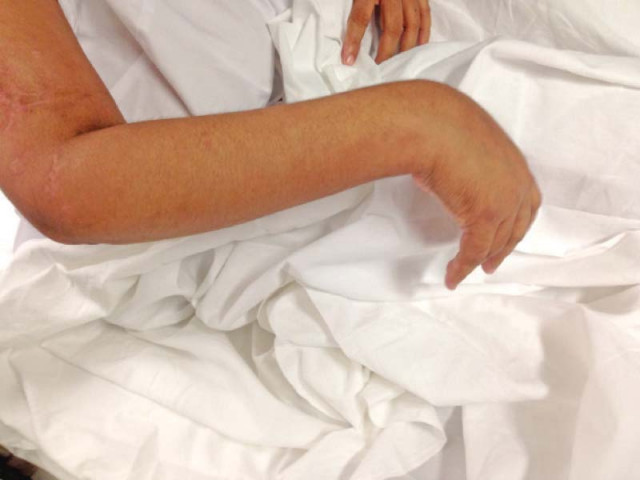For radial nerve injury patients, Dr Rahman performs miracles
The surgeon helps crippled patients regain function in their hands through nerve transfers

Radial nerve injury is common in countries such as Pakistan where road accidents and firing incidents are a matter of routine. Dr Rahman uses a new technique to facilitate wrist and finger movement in such cases. PHOTO: COURTESY AKUH
The radial nerve injury that he sustained left him unable to extend his fingers or move his wrist and, due to stiffness in his tendons, he could neither fully open his hand nor close it.
"I was brought to Aga Khan University Hospital (AKUH) but did not have the money to pay for the surgery," recounts the 28-year-old man. "The hospital operated on me on discounted rates with the help of the hospital's welfare department."
Radial nerve injury is common in countries such as Pakistan where road accidents and firing incidents are a matter of routine, AKUH plastic, reconstructive and hand surgeon Dr Fazlur Rahman tells The Express Tribune.
According to Dr Rahman, a new way to treat this injury is through nerve transfer by transferring small nerve fibres from an adjoining median nerve to the radial nerve fibres, which facilitate wrist and finger movement. "It is just like connecting two wires together to restore electrical supply," he says. "Since we only take a single fibre, there is hardly any damage to the median nerve territory."
This transfer, he claims, leads to the return of radial nerve function within six months, with near-normal function within a year. Unlike other methods of treatment, the patient does not need a plaster either, he adds, but simple physiotherapy is recommended for about three to six months after the surgery, which costs Rs150,000 at AKUH. However, unlike the more common tendon transfers, radial nerve transfer can only be done three to six months of the injury.
Since Dr Rahman joined AKUH, he has conducted nine nerve transfer surgeries. The first of these was on a 28-year-old Afghan man, Lias Shujja, in 2012.
Shujja was shot in both his hands during a kidnapping bid outside his house in Hayatabad, Peshawar. "It left me paralysed. I could not even write properly," he recalls. He was operated on at Rehman Medical Complex, Peshawar, but the very next day, he found out that almost two centimetres of his radial nerve had been destroyed. His sister-in-law, a doctor, suggested that he consult more experienced doctors.
"Plastic surgeons kept advising me to get a tendon transfer," he narrates. "Finally, a friend told me to go see the doctors at AKUH. I talked to Dr Rahman, who told me that tendon transfers were now outdated; instead, he said, the new method of nerve transfers would provide better results." Shujja took the next flight to Karachi to meet the surgeon, who operated on him in December 2012.
In May 2013, Shujja found out that his arm, broken at the same time, had not healed. "I was in Delhi, India, for treatment for the broken bone when I felt movement in my wrists and fingers," he says. "When I explained everything to a doctor there, he was surprised and told me that Dr Rahman had probably just operated on me to earn money; he believed that my radial nerve was just damaged and was healing itself. But today, I am leading a normal life and can write and type too."
Dr Rahman was part of a research team in the United States, doing nerve transfers to repair radial nerve damage. According to him, he developed an interest in the field because of the numerous road and industrial accidents that occur in Pakistan. He is also making sure that other surgeons in the city do not lag behind. "I am training more surgeons in Karachi and the surgery is now also being performed at Liaquat National Hospital and Patel Hospital."
Dr Mazhar Nizam, the medical director at Patel Hospital, lauded him for introducing and popularising radial nerve surgery in the metropolis. "He is doing an excellent job in this field."
Published in The Express Tribune, September 4th, 2015.



















COMMENTS
Comments are moderated and generally will be posted if they are on-topic and not abusive.
For more information, please see our Comments FAQ